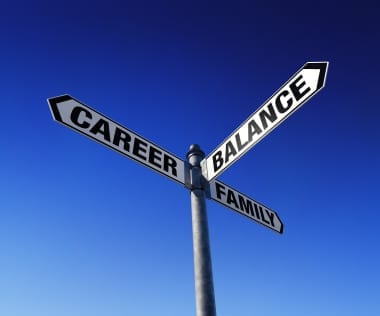 If you don’t, its not your fault.
If you don’t, its not your fault.
I just read a brilliant article in The Atlantic by Anne-Marie Slaughter that examines what it will take for women to ‘have it all,’ and it is well worth a read (after you finish this of course). It touched a chord with me because re-entering the workforce has been on my mind lately.
I left my marketing role when my first child was born five years ago and I’ll be honest, the thought of taking that first step of finding a new job keeps me awake at night. While five years really is only a blip in the long run; when you’re in it, it seems like an eternity.
I know there are women out there that feel the same as I do. In fact, I’m friends with a bunch of them. Well educated women, many with post graduate degrees, that have made the choice to be stay-at-home moms. We all realize how fortunate we are to be able to have that choice but at some point, I knew I would always want to return to the workforce.
As I evaluate my opportunities, different factors are important to me now that were not important to me in a job in my late twenties and early thirties. And unfortunately, roles as Brand Managers place an importance on ‘face time’ or ‘office time’ and many lack the flexibility that I would value. I have worked for companies that talk a lot about ‘work-life balance’ but the reality is much different than the talk, especially when it comes to child care. Co-workers do not always smile upon those who take time to care for children, regardless of how much extra time is put in behind the scenes to make up for those hours.
To steal an example from Anne-Marie Slaughter:
“Many people in positions of power seem to place a low value on child care in comparison with other outside activities. Consider the following proposition: An employer has two equally talented and productive employees. One trains for and runs marathons when he is not working. The other takes care of two children. What assumptions is the employer likely to make about the marathon runner? That he gets up in the dark every day and logs an hour or two running before even coming into the office, or drives himself to get out there even after a long day. That he is ferociously disciplined and willing to push himself through distraction, exhaustion, and days when nothing seems to go right in the service of a goal far in the distance. That he must manage his time exceptionally well to squeeze all of that in. Be honest: Do you think the employer makes those same assumptions about the parent?”
I chose to earn a graduate business degree because I value my career and wanted to invest in my future to ensure that I always had opportunities available to me. But I also chose to have three children because I value family. So how do I reconcile the two?
We really should be able to thrive in our career choices and drive to be leaders of organizations without compromising our family lives. But as Slaughter points out by quoting Sheryl Sandberg, “Women are not making it to the top. A hundred and ninety heads of state; nine are women. Of all the people in parliament in the world, 13 percent are women. In the corporate sector, [the share of] women at the top, C-level jobs, board seats, tops out at 15, 16 percent.”
The pool of candidates for leadership roles is small and will only decrease in size as more women take time out to care for their families, says Slaughter.
In order for real change to occur in the workplace, more women need to be in leadership positions. We need change in the form of measuring real value added, instead of perceived value add, and of measuring performance on results, rather than hours worked. Until that happens, we need to stop making women feel inadequate for not being able to strike the perfect balance between home life and family life. And women need to cut themselves some slack when they feel as though nothing is being done to the best of their abilities. It is not the woman, or her drive, or commitment level, it is the lack of flexibility in the workplace that is the obstacle.
Today we may not be able to have it all; We have to work the system to the best of our abilities, raise our families the best we can, rise up to leadership roles, and make the changes that allow us to work smarter, but not necessarily longer.
What do you think? Do you feel like you have it all? If you don’t, what are the obstacles that you feel like you are facing? If you do feel like you have it all, what advice do you have?





